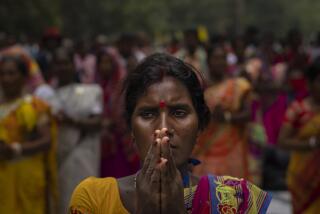Generation Gap Seen Among U.S. Buddhists : Activism: Younger immigrants and converts may have more interest than traditionalists in linking faith’s tenets to social and political issues.
- Share via
If Buddhism is ever to gain a national voice on social and ethical issues, it will have to look to U.S.-born converts and a younger generation of Asian immigrants, say leaders of a movement for an American version of the 2,500-year-old religion.
“There is a generation gap,” said the Venerable Havanpola Ratanasara of Los Angeles, who was reelected executive president of the American Buddhist Congress at the group’s recent national convention in Koreatown.
“The older Asian Buddhist communities like to perpetuate the old type of cultural norms and practices,” said Ratanasara. These Buddhist groups often have leaders with limited command of English and serve ethnic communities that are generally uninterested in American public issues or in propagating Buddhist values through mass media, he said.
By contrast, Ratanasara said, the second and third generations of Asian Buddhist immigrants tend to reflect the broader, public affairs interests of their college classmates and work colleagues, as well as those of many U.S converts to the Eastern religion.
The American Buddhist Congress, which has members in Thai, Chinese, Korean, Sri Lankan, Tibetan, Vietnamese, Cambodian and Japanese national traditions in addition to U.S.-born American converts, has struggled since its founding in Los Angeles eight years ago to bring together significant numbers of monks, masters and laity who support pan-Buddhist goals.
At the congress meeting last month, keynote speaker Ananda W.P. Guruge told nearly 100 registrants that “ethnic Buddhists” have an obligation to apply Buddhist ideals to social issues in this country, such as racism, welfare and abortion.
At the meeting, held at Kwan Um Sa Temple in Koreatown, Congress leaders talked bluntly and impatiently about the need for fund-raising campaigns--”a concept that is still very foreign to Buddhist thinking in general,” said Chrys Thorsen, one of the convention organizers.
Ratanasara, 76, is an exception to the non-activist Buddhist image. The native Sri Lankan, now a U.S. citizen, formed the multi-tradition Buddhist Sangha Council of Southern California shortly after arriving in Los Angeles in 1980. He also was instrumental in forming the national congress.
“I always encourage the Buddhist communities to integrate into society,” said Ratanasara.
One philosophical dissenter to Buddhist activism during the congress’ national meeting was the lone Japanese-heritage Buddhist on the program, Mokusen Miyuki, professor of religious studies at Cal State Northridge and a Jungian psychotherapist who does private consulting work.
Asked to lead a workshop on “Dissemination of the Buddha’s Teachings,” Miyuki conceded that he was not interested in organizing American practitioners or propagating principles of Buddhism, taught 500 years before Christ by Gautama Buddha in northern India.
Key Buddhist teachings of impermanence, suffering and selflessness are realities that can be discovered by reflection whether Buddhists actively teach them or not, Miyuki said.
For example, he said the Buddhist view that all things are interrelated has become a part of the public consciousness, in part because of growing concern over the world’s fragile ecological systems.
Ratanasara contends that such passive views are changing. Active pan-Buddhist groups, promoting a distinctively American Buddhism, are strong in Los Angeles, Chicago and Houston, and to some extent in Washington, D.C., and New York, Ratanasara said.
Some analysts are less optimistic about achieving respectful links between Buddhist sects and meditation centers in this country.
Writing in Tricycle, a Buddhist quarterly published in New York, Jan Nattier, who teaches Buddhist studies at Indiana University, said American-born converts to Buddhism tend to gravitate toward various demanding forms of Zen or Tibetan traditions while ignoring other ethnic groups.
And there is an extraordinary lack of communication among various ethnic groups, Nattier said.
Addressing that fragmentation in his speech to the American Buddhist Congress, Guruge said the future of Buddhism in America lies not only with cooperation among U.S.-born converts and ethnic leaders, but also among numerous religious “seekers” and friends of Buddhism.
“Very serious seekers wish to ascertain whether Buddhism actually lives up to its reputation as a . . . tolerant, dogma-free, ethically pragmatic and non-rigid religious system,” said Guruge, a Huntington Beach resident who formerly served as Sri Lankan ambassador to the United States. He is now a vice president of the World Fellowship of Buddhists.
These seekers are often decision-makers and opinion leaders in America, and as such, Guruge claimed, “the best and most convincing publicity agents for Buddhism.”
More to Read
Sign up for Essential California
The most important California stories and recommendations in your inbox every morning.
You may occasionally receive promotional content from the Los Angeles Times.













